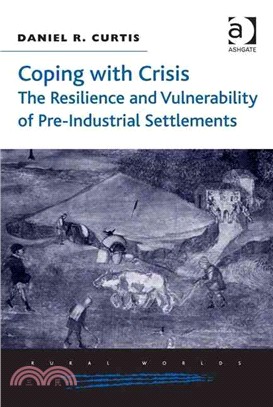Coping With Crisis ─ The Resilience and Vulnerability of Pre-Industrial Settlements
商品資訊
系列名:Rural Worlds: Economic, Social and Cultural
ISBN13:9781472420046
出版社:Ashgate Pub Co
作者:Daniel R. Curtis
出版日:2014/08/28
裝訂/頁數:精裝/348頁
規格:24.8cm*17.1cm*3.2cm (高/寬/厚)
定價
:NT$ 9000 元優惠價
:90 折 8100 元
若需訂購本書,請電洽客服 02-25006600[分機130、131]。
相關商品
商品簡介
作者簡介
商品簡介
Why in the pre-industrial period were some settlements resilient and stable over the long term while other settlements were vulnerable to crisis? Indeed, what made certain human habitations more prone to decline or even total collapse, than others? All pre-industrial societies had to face certain challenges: exogenous environmental hazards such as earthquakes or plagues, economic or political hazards from a€?outsidea€? such as warfare or expropriation of property, or hazards of their own-making such as soil erosion or subsistence crises. How then can we explain why some societies were able to overcome or negate these problems, while other societies proved susceptible to failure, as settlements contracted, stagnated, were abandoned, or even disappeared entirely? This book has been stimulated by the questions and hypotheses put forward by a recent a€?disaster studiesa€? literature - in particular, by placing the intrinsic arrangement of societies at the forefront of the explanatory framework. Essentially it is suggested that the resilience or vulnerability of habitation has less to do with exogenous crises themselves, but on endogenous societal responses which dictate: (a) the extent of destruction caused by crises and the capacity for society to protect itself; and (b) the capacity to create a sufficient recovery. By empirically testing the explanatory framework on a number of societies between the Middle Ages and the nineteenth century in England, the Low Countries, and Italy, it is ultimately argued in this book that rather than the protective functions of the state or the market, or the implementation of technological innovation or capital investment, the most resilient human habitations in the pre-industrial period were those than displayed an equitable distribution of property and a well-balanced distribution of power between social interest groups. Equitable distributions of power and property were the underlying conditions in pre-industrial societies that allowed 'favourable' institutions to emerge with high rates of participation down the social hierarchy, giving people the freedom and room to choose their own fate - not necessarily reliant on one coping strategy but with the capacity to combine many different ones in search of optimum resilience.
作者簡介
Daniel R. Curtis is currently working at Utrecht University at the Research Institute for History and Art History, and is employed on a European Research Council-funded project entitled 'Coordinating for Life. Success and Failure of Western European Societies in Coping with Rural Hazards and Disasters, 1300-1800' led by Professor Bas van Bavel. He has published articles in a variety of journals such as Continuity and Change, Journal of Medieval History, and Journal of Historical Geography, on an assortment of themes including rural resilience and vulnerability to shocks and stress, settlement development, land consolidation and inequality, the relationship between city and countryside, and common-pool resources.
主題書展
更多
主題書展
更多書展本週66折
您曾經瀏覽過的商品
購物須知
外文書商品之書封,為出版社提供之樣本。實際出貨商品,以出版社所提供之現有版本為主。部份書籍,因出版社供應狀況特殊,匯率將依實際狀況做調整。
無庫存之商品,在您完成訂單程序之後,將以空運的方式為你下單調貨。為了縮短等待的時間,建議您將外文書與其他商品分開下單,以獲得最快的取貨速度,平均調貨時間為1~2個月。
為了保護您的權益,「三民網路書店」提供會員七日商品鑑賞期(收到商品為起始日)。
若要辦理退貨,請在商品鑑賞期內寄回,且商品必須是全新狀態與完整包裝(商品、附件、發票、隨貨贈品等)否則恕不接受退貨。






















